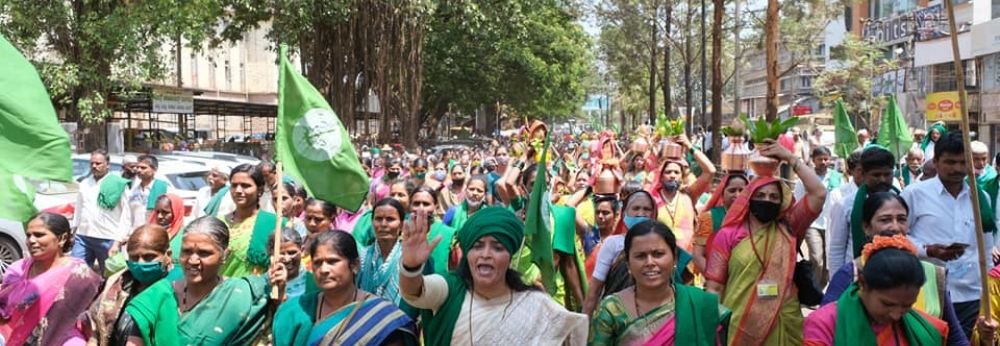The Indian coordination committee of farmers’ movements (ICCFM) has written a letter to the Indian commerce minister and other officials, reiterating their support for a permanent solution to the public stockholding issue at the WTO.
The 13th Ministerial Meeting of the WTO is set to commence on February 26th, and India has been among the leading advocates on vital issues of domestic support and Public Stock Holding (PSH) programs that developing countries and least developed countries want to undertake.
“For nearly 30 years now, the WTO has always challenged the efforts to provide remunerative prices to farmers. Due to the highly unfair trade rules established by this institution, Indian small-scale farmers have never received a fair price for their produce. Consequently, rural India is now grappling with a debt crisis that has claimed the lives of more than 350,000 farmers in 30 years. The new-age trade agreements being pushed bilaterally between India and other countries appear to replicate the highly problematic policies of the WTO, such as low tariffs/tariff elimination resulting in increasing import dependency, incentivization of large-scale monoculture farms, increasing mechanization and digitalization, and promoting the use of chemical inputs. Some of these agreements, whether bilateral or multilateral, are also paving the way for deregulation of some of India’s policies related to GMOs, farmers’ seeds, and more. Despite India’s agriculture being predominantly small-scale, most policies are designed to facilitate the corporatization of the agricultural sector,” the letter reads.
ICCFM is a coalition of peasant organizations from the states of Uttar Pradesh, Haryana, Punjab, Himachal Pradesh, Madhya Pradesh, Karnataka, Tamil Nadu, Kerala, and Maharashtra.
They note that while the 2013 Bali Ministerial decision offered a temporary “peace clause” allowing developing countries to exceed WTO-prescribed agriculture subsidy limits, India’s use of this peace clause has faced harsh questioning at the WTO. Attempts by agricultural exporting countries to first allow only an onerous peace clause and then challenge the application of the peace clause highlight the need for a permanent solution.
The coalition has also asked the government to defend all the domestic support programs. They have warned [the WTO] against any attempts to curtail the government’s ability to provide essential domestic subsidies to farmers.
“These crucial subsidies, including input subsidies which are given as a policy tool for supporting agricultural development under special and differential treatment and the de minimis allowances which include Minimum Support Prices (MSPs) and Fair and Remunerative Price (FRP), ensure our survival and ability to invest in seeds, fertilizers, and other inputs. Without them, many farmers will be pushed into further poverty and despair,” the letter reads.
The letter has also questioned the push within the WTO on standards related to ‘sustainability’ in agriculture.
The letter states, “Discussions at MC 13 must also focus on promoting ecological agricultural practices and ensuring the livelihoods of small and marginal farmers which go hand in hand. Indian farmers produce sustainably, and we do not need to be told by developed countries how to pursue sustainable agriculture. We believe they are bringing in sustainability related language in the WTO in order to protect their commercial interests by imposing harsh standards on us. This will threaten our livelihoods and domestic agricultural development by restricting the export of our agroecological produce. We urge you to advocate for policies that uphold our food sovereignty and support agroecology, crop diversification, and fair and guaranteed prices for our produce.”
India is currently witnessing a resurgence of the farmers’ protest that caught global attention in 2020 and 2021. On February 26th, the protesting farmers have vowed to observe “Quit WTO day” to highlight the devastating impact that neoliberal policies have had on the country’s agricultural sector over the past 30 years.
Cover Image: KRRS. (Representative image from 2021. Women from the Karnataka State Farmers’ Association staging a demonstration. )

